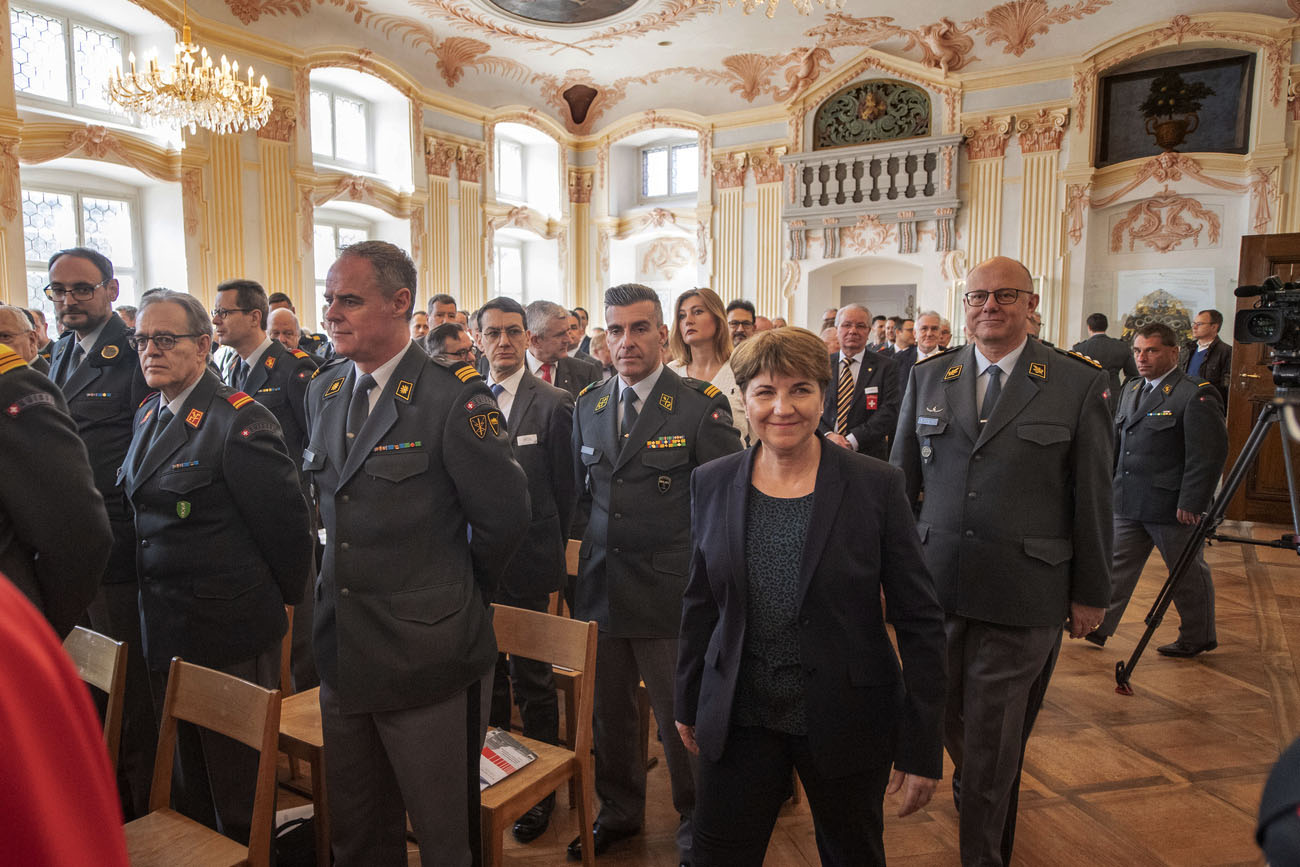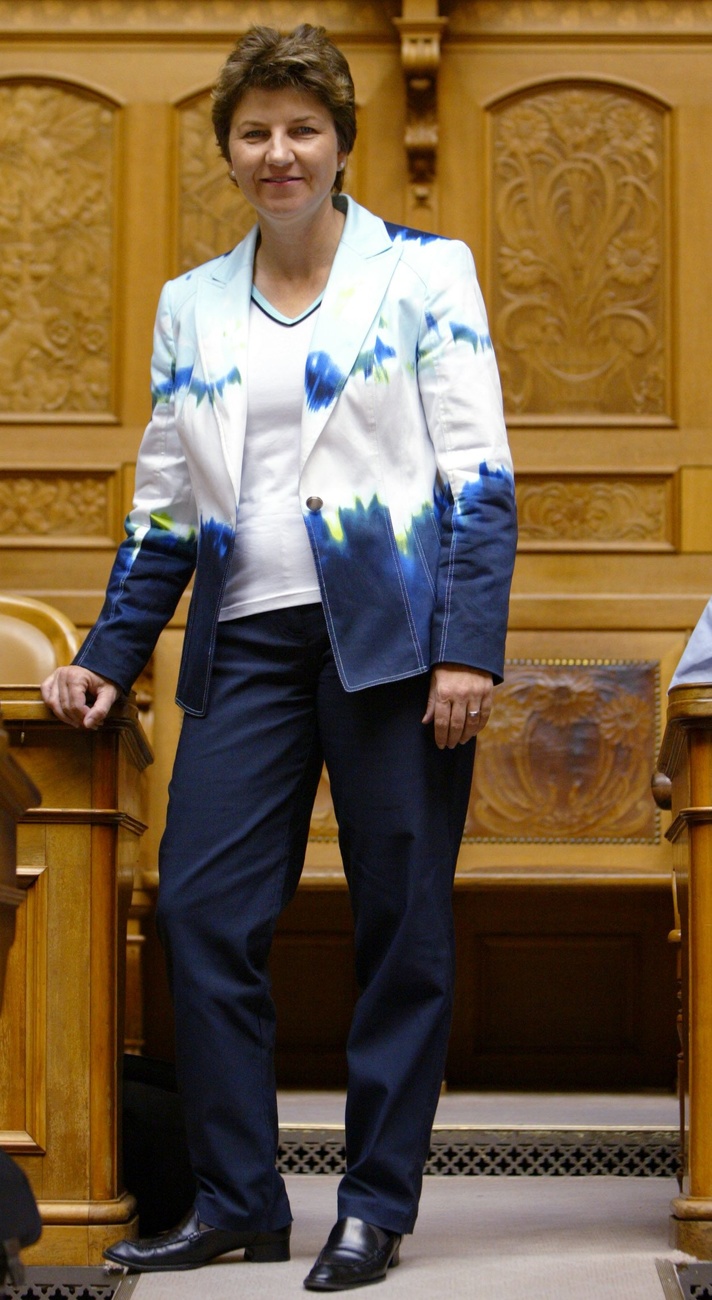
After conquering army, Viola Amherd steps into role of Swiss President

As Switzerland’s first female defence minister, Viola Amherd has overcome the masculine power structures of the Swiss Army. Now she is set to step into the rotating presidency of the country.
When Amherd was elected to the Federal Council, the executive branch of the government, in 2018, she took what was given to her: the defence ministry.
“Well then, if that’s the way it is, I’ll do it,” the Centre Party politician told Swiss television in 2020.
Compared to other government departments, the Federal Department of Defence, Civil Protection and Sport was always regarded as difficult to steer – a tanker that ran on autopilot and did not need a captain to guide it. As head of the department, the minister’s room for manoeuvre was greatly limited by framework conditions that were more or less fixed.
Then came a female captain, one who asked critical questions. At first the commanders had to get used to this, with many thinking Amherd could be pushed aside. Maybe she would even move to another department. Instead, she stayed.
How does the army work? “From bottom to top, every level is filtered, until right at the top there is only good news,” says Pirmin Schwander, an army colonel and member of the right-wing Swiss People’s Party. Getting the right information to run this department is almost impossible.
A pillar of strength
Amherd, however, has managed to do just that. Without any experience, she conquered the male bastion of military service. “No prior insights – that was an advantage,” says Schwander, who in recent years has guided the defence ministry as a member of the parliamentary finance committee. Amherd was willing to take a closer look than others.
Priska Seiler Graf, a member of the House of Representatives who sits on the security policy committee, also recognises Amherd’s leadership qualities. “She has left her mark on the department, which is not easy to do”, she remarks.

Who is Viola Amherd? A telling scene played out in the sports hall of the small Bernese village of Mitholz on a cold evening in February 2020. For decades the Swiss military had stored 3,500 tonnes of ammunition in a mountain above the village. That ammunition was now at risk of exploding.
Viola Amherd had the unenviable task of informing the residents of Mitholz that 170 of them would have to leave their homes for a lengthy period of time. It was a catastrophe that brought the residents to tears.
Amherd delivered the news personally, before a crowd of resentful residents. Later that evening, with the official business over, Amherd’s limousine waited outside to drive her away. But she did not leave. She stayed with the locals, a pillar of strength and empathy.
Taking control of her destiny
Amherd was born in 1962 to Catholic parents in the Alpine town of Brig in southern Switzerland. Her ambitious father ran an electric goods business that quickly expanded into the surrounding valleys. Within a short time, he had acquired over 100 employees. However, his ambition had a negative effect on his marriage.
When young Viola graduated from the Spiritus Sanctus College in Brig with a degree in Latin, her parents divorced. In Catholic Valais at that time, divorce was not well-accepted.
Amherd’s mother advised her to remain independent and take control of her future. She recalled her mother telling her, “As a woman, you have to fight alone”.
“We mountain dwellers have mountains in our heads,” says Amherd today.
Video: The people of Brig celebrating Amherd’s presidency.
In high school, Amherd wrote her Baccalaureate essay on the subject of anarchy, then went on to study law at the University of Fribourg.
However, the 29-year-old had to be persuaded to enter politics. “You can’t complain about a lack of opportunities for women and then say no when you have an opportunity”, said a female friend who convinced Amherd to take this path.
She joined the Brig city council in 1993 and continued to work as a lawyer and notary throughout that decade. She lived in the same house as her sister, 14 years older, and her niece. When asked, she described herself as being single. “It’s nice that way – I am free,” she once told the tabloid Blick.
Commitment to children and family
In 1993 a flood ravaged central Brig. City councillor Amherd proved herself to be an efficient crisis manager. She raised her profile in her home canton of Valais, became mayor of her town, streamlined the executive office and, in 2005, won a seat in parliament in Bern.

When she entered national politics, she worked to ensure that the protection of children and youth was written into the constitution. Other initiatives were also aimed at protecting children and young people. The issues she tackled included sexting, child custody, cyber-grooming, child prostitution and youth protection in the media. Her motivation stemmed from her work as a divorce lawyer, during which Amherd represented women and got to know family histories.
In 2009, she ensured that more places in care homes became available for people with dementia, a cause close to her heart. Together with her sister, Amherd took care of her own mother, who suffered from the illness. She also became committed to the concerns of her own canton, as well as mountain regions in general.
‘An instinct for possibilities’
Martin Candinas, a member of the Centre party in the House of Representatives, sat next to Amherd in parliament. When asked what his colleague’s greatest strength is, he says: “She always looks at the whole picture and has an instinct for possibilities”.
Amherd took over leadership of the defence ministry in 2019. When she took her first flight in an army helicopter, she made a point when choosing her crew. Three women flew her to Davos for the World Economic Forum. As minister, her goal is to increase the number of women in the army. She’s also fighting for women to hold leadership positions in sports organisations.

When asked about the promotion of women, Amherd told Swiss television SRF: “If the qualifications are the same, I would give the woman the position until the numbers are equal”.
With her curiosity and precision in day-to-day business, Amherd has earned the respect of the army cadre. She has also won over parliament with her knowledge of dossiers and her pragmatism.
Amherd has effortlessly integrated the core tasks of her department into her moral compass. It was just a small step for her to move from the protection of family to the protection of the Swiss population. She is well-liked by the Swiss people and is neither conceited nor aloof. She is charismatic, but always says the right thing and comes across as genuine.
Commitment to Switzerland’s place in the world
In 2020 she convinced Swiss voters to commit CHF6 billion ($7.03 billion) towards the purchase of new fighter jets – and this at a time when conventional warfare in Europe was barely imaginable. Some opposition arose when the type of fighter jet on the table became known: the F35 from the American company Lockheed Martin. Georg Häsler, defence correspondent for the Neue Zürcher Zeitung, praised the low price that Switzerland negotiated for the purchase.
“It remained unclear, though, why she continued to negotiate for so long with contractors from France,” says Häsler. In doing so, Amherd hurt Switzerland’s relationship with France.
Then Russia invaded Ukraine. “She realised very quickly that Switzerland would have to cooperate internationally,” says Häsler.

Once again Amherd persuaded the Swiss public of the importance of security policy. She allocated CHF32 billion to the Swiss Army, a record budget. But she also caused friction with the creation of a State Secretariat for Security Policy. “The enemies of NATO and the friends of Russia in Switzerland resented this,” says Häsler.
At the end of 2023, she was also criticised for some personnel decisions. She’s taken this criticism in her stride.
The presidency of the Swiss Confederation is a one-year term, and the power of this office is limited. Amherd wants to use this time to consolidate Switzerland’s international integration. Negotiations with the European Union on future cooperation are pending.
For the time being she will have to put her hobbies – skiing, hiking and mountain-biking – on hold.
Adapted from German by Sue Brönnimann/gw

In compliance with the JTI standards
More: SWI swissinfo.ch certified by the Journalism Trust Initiative































You can find an overview of ongoing debates with our journalists here . Please join us!
If you want to start a conversation about a topic raised in this article or want to report factual errors, email us at english@swissinfo.ch.